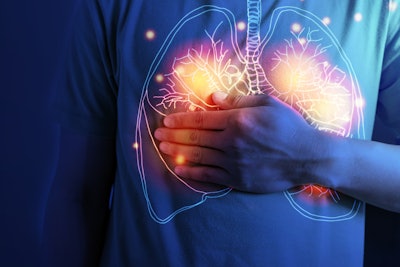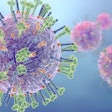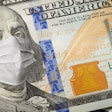
Severe COVID-19 infection resulting in hospitalization increases the risk of poor cardiovascular health outcomes, according to a study published this week in Heart.
Researchers conducted a prospective analysis of UK Biobank participants to evaluate the association between COVID-19 and incident cardiovascular disease (CVD) events following infection.
“The long-term sequelae of past COVID-19 exposure is emerging as a dominant public health concern,” the authors wrote.
Previous studies have suggested such an association, but “existing evidence is mostly limited to retrospective studies, includes only a narrow selection of cardiovascular outcomes, and lacks adequate consideration of differential risk by COVID-19 severity,” the researchers wrote.
Drawing on 53,613 UK Biobank participants, the researchers identified 17,871 who had been diagnosed with COVID-19 between March 2020 and March 2021. The remaining 35,742 uninfected participants were treated as the control group.
The COVID-19 cohort “included slightly more men, were less affluent, and had poorer cardiometabolic health,” the researchers wrote.
Following up with the participants, the investigators checked for numerous cardiovascular outcomes including heart attack, stroke, heart failure, atrial fibrillation, venous thromboembolism, and pericarditis.
Follow-up continued until the first episode of a specific CVD outcome, death (either from any cause or from CVD), or the end of the follow-up period in March 2021.
Eighty percent of participants with past COVID-19 had not been not hospitalized. Among the remaining participants, 75.7% were hospitalized with COVID-19 and 24.3% were diagnosed as having COVID-19 as a secondary condition.
Nonhospitalized participants with COVID-19 experienced a more than 2.7-fold greater risk of incident venous thromboembolism, and more than a tenfold risk of all-cause death than uninfected controls, the researchers found.
Patients hospitalized with COVID-19 as a primary diagnosis experienced greater risk of all outcomes. The risk of incident venous thromboembolism increased by 27.6-fold, heart failure by 21.6-fold, and stroke by 17.5-fold.
Risk of all-cause death increased 118-fold in these patients, while risk of CVD death increased almost 9-fold and ischemic heart disease death by more than 14-fold, the authors also said in the study.
Patients hospitalized with COVID-19 as a secondary diagnosis also experienced greater cardiovascular risk than control patients. The risk of all-cause death was less augmented than in patients hospitalized with COVID-19 as a primary diagnosis, and incident myocardial infarction and atrial fibrillation increased to a greater extent.
The researchers added, “Most events occurred in the early post infection period, typically within 30 days of infection,” but notably, the risks “remained higher than controls even after this period.” This was particularly true for heart failure, atrial fibrillation, venous thromboembolism, pericarditis, and all-cause deaths, they said.
Death by any cause was also the highest for those who had been hospitalized due to COVID compared to the control patients.
The researchers acknowledged that their study had limitations. As it was strictly observational, no definitive conclusions can be drawn about cause and effect, they noted.
The study did not consider the influence of cardiovascular medications, vaccination, new variants, or multiple infection exposure.
“Our findings highlight the increased cardiovascular risk of individuals with past infection, which are likely to be greater in countries with limited access to vaccination and thus greater population exposure to COVID-19,” the team wrote.
They also said that “the long-term cardiovascular consequences… may be relevant in the context of future pandemics of similar viral infections.”



















